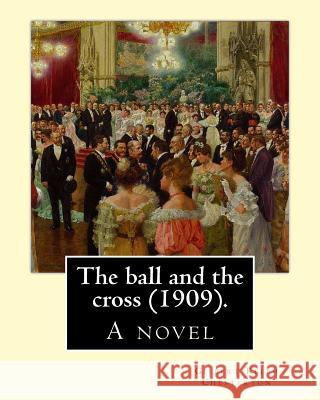The ball and the cross (1909). By: Gilbert Keith Chesterton: A novel » książka
The ball and the cross (1909). By: Gilbert Keith Chesterton: A novel
ISBN-13: 9781537675480 / Angielski / Miękka / 2016 / 128 str.
Like much of G. K. Chesterton's fiction, The Ball and the Cross is both witty and profound, cloaking serious religious and philosophical inquiry in sparkling humor and whimsy. Serialized in the British publication The Commonwealth in 1905-06, Chesterton's second novel first appeared in book form in America in 1909, delighting and challenging readers with its heady mixture of fantasy, farce, and theology. The plot of The Ball and the Cross chronicles a hot dispute between two Scotsmen, one a devout but naive Roman Catholic, the other a zealous but naive atheist. Their fanatically held opinions-leading to a duel that is proposed but never fought-inspire a host of comic adventures whose allegorical levels vigorously explore the debate between theism and atheism. Martin Gardner's superb introduction to The Ball and the Cross reveals the real-life debate between Chesterton and a famous atheist that provided inspiration for the story, and it explores some of the novel's possible allegorical meanings. Appraising the book's many intriguing philosophical qualities, Mr. Gardner alerts readers as well to the pleasures of its "colorful style . . . amusing puns and clever paradoxes . . . and the humor and melodrama of its crazy plot." Gilbert Keith Chesterton, KC*SG (29 May 1874 - 14 June 1936), better known as G. K. Chesterton, was an English writer, poet, philosopher, dramatist, journalist, orator, lay theologian, biographer, and literary and art critic. Chesterton is often referred to as the "prince of paradox."Time magazine has observed of his writing style: "Whenever possible Chesterton made his points with popular sayings, proverbs, allegories-first carefully turning them inside out." Chesterton is well known for his fictional priest-detective Father Brown, and for his reasoned apologetics. Even some of those who disagree with him have recognised the wide appeal of such works as Orthodoxy and The Everlasting Man.Chesterton, as a political thinker, cast aspersions on both Progressivism and Conservatism, saying, "The whole modern world has divided itself into Conservatives and Progressives. The business of Progressives is to go on making mistakes. The business of the Conservatives is to prevent the mistakes from being corrected."Chesterton routinely referred to himself as an "orthodox" Christian, and came to identify this position more and more with Catholicism, eventually converting to Catholicism from High Church Anglicanism. George Bernard Shaw, Chesterton's "friendly enemy" according to Time, said of him, "He was a man of colossal genius."Biographers have identified him as a successor to such Victorian authors as Matthew Arnold, Thomas Carlyle, Cardinal John Henry Newman, and John Ruskin.Chesterton was born in Campden Hill in Kensington, London, the son of Marie Louise, nee Grosjean, and Edward Chesterton.He was baptised at the age of one month into the Church of England, though his family themselves were irregularly practising Unitarians.According to his autobiography, as a young man Chesterton became fascinated with the occult and, along with his brother Cecil, experimented with Ouija boards. Chesterton was educated at St Paul's School, then attended the Slade School of Art to become an illustrator. The Slade is a department of University College London, where Chesterton also took classes in literature, but did not complete a degree in either subject.
Zawartość książki może nie spełniać oczekiwań – reklamacje nie obejmują treści, która mogła nie być redakcyjnie ani merytorycznie opracowana.











